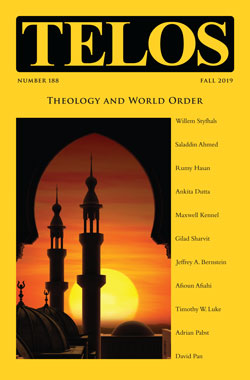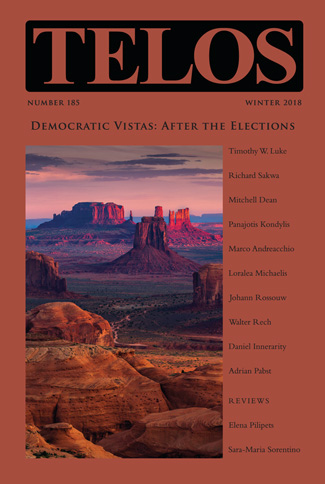By Maxwell Kennel · Friday, November 15, 2019 Maxwell Kennel’s “Periodization and Providence: Time and Eternity between Nietzsche’s Zarathustra and Augustine’s Confessions” appears in Telos 188 (Fall 2019). Read the full article at the Telos Online website, or purchase a print copy of the issue in our online store. Individual subscriptions to Telos are available in both print and online formats.
 In order to address the politics of temporal regulation and periodization, while considering ways in which competing religious and secular narratives construct contemporary subjectivity, this article compares the quasi-autobiographical narratives of Friedrich Nietzsche’s Thus Spoke Zarathustra and Saint Augustine’s Confessions. Looking beneath the surface differences between these two works, this study draws out surprising affinities and continuities between Zarathustra and the Confessions and compares each work’s vision of time and eternity. By examining Zarathustra’s parable of the gate and its punctuating moment (Augenblick) alongside Augustine’s notion of the distentio animi in book 11 of the Confessions, this article questions competing Christian and anti-Christian narratives and their use of teleology and providence in the periodization of time, and concludes by contesting these narratives from the standpoint of postsecular critique. In order to address the politics of temporal regulation and periodization, while considering ways in which competing religious and secular narratives construct contemporary subjectivity, this article compares the quasi-autobiographical narratives of Friedrich Nietzsche’s Thus Spoke Zarathustra and Saint Augustine’s Confessions. Looking beneath the surface differences between these two works, this study draws out surprising affinities and continuities between Zarathustra and the Confessions and compares each work’s vision of time and eternity. By examining Zarathustra’s parable of the gate and its punctuating moment (Augenblick) alongside Augustine’s notion of the distentio animi in book 11 of the Confessions, this article questions competing Christian and anti-Christian narratives and their use of teleology and providence in the periodization of time, and concludes by contesting these narratives from the standpoint of postsecular critique.
Continue reading →
By Loralea Michaelis · Monday, February 25, 2019 Loralea Michaelis’s “Temporality and Revolution in Horkheimer’s Early Critical Theory: A Luxemburgian Reading of Dämmerung” appears in Telos 185 (Winter 2018). Read the full article at the Telos Online website, or purchase a print copy of the issue in our online store. Individual subscriptions to Telos are available in both print and online formats.
 This article challenges the related assumptions about temporality and the significance of success and failure for revolutionary activism that have governed the standard interpretation of Horkheimer’s critical theory as foundering on the disappointment of its early revolutionary expectations. The early influence of Luxemburg on Horkheimer is used to bring into clearer focus Horkheimer’s handling of the problem of a failed revolution in Dämmerung, his earliest published work, which bears a striking resemblance to Luxemburg’s own positions on the centrality of failure to the development of the revolution as well as her critique of the success-oriented politics of reformism. Dämmerung foregrounds the German revolution of 1919–23, but the working through of its failure yields not pessimism over the future but a challenge to the preoccupation with future prospects which underlies both pessimism and optimism; it also yields a conception of revolution as a present-oriented resistance that not only does not expect to succeed in its aims but regards the aim of success with a skeptical eye. Contrary to the standard reading, the failed revolution is not a problem for which Horkheimer’s early critical theory needs to find a solution; rather, it is its practical correlative. This article challenges the related assumptions about temporality and the significance of success and failure for revolutionary activism that have governed the standard interpretation of Horkheimer’s critical theory as foundering on the disappointment of its early revolutionary expectations. The early influence of Luxemburg on Horkheimer is used to bring into clearer focus Horkheimer’s handling of the problem of a failed revolution in Dämmerung, his earliest published work, which bears a striking resemblance to Luxemburg’s own positions on the centrality of failure to the development of the revolution as well as her critique of the success-oriented politics of reformism. Dämmerung foregrounds the German revolution of 1919–23, but the working through of its failure yields not pessimism over the future but a challenge to the preoccupation with future prospects which underlies both pessimism and optimism; it also yields a conception of revolution as a present-oriented resistance that not only does not expect to succeed in its aims but regards the aim of success with a skeptical eye. Contrary to the standard reading, the failed revolution is not a problem for which Horkheimer’s early critical theory needs to find a solution; rather, it is its practical correlative.
Continue reading →
By Robert Wyllie · Thursday, March 27, 2014 The following paper was presented at the Eighth Annual Telos Conference, held on February 15–16, 2014, in New York City.
Kierkegaard is the first to call modern Christians “pagans.” If Augustine’s critique of the Physicalists in the City of God was the last critique of ancient pagan time, Kierkegaard’s critique of our present “abstract infinity” is the first critique of modern pagan time. Augustine and Kierkegaard are like bookends on the complex sacred time of the Middle Ages.
Continue reading →
|
|
 In order to address the politics of temporal regulation and periodization, while considering ways in which competing religious and secular narratives construct contemporary subjectivity, this article compares the quasi-autobiographical narratives of Friedrich Nietzsche’s Thus Spoke Zarathustra and Saint Augustine’s Confessions. Looking beneath the surface differences between these two works, this study draws out surprising affinities and continuities between Zarathustra and the Confessions and compares each work’s vision of time and eternity. By examining Zarathustra’s parable of the gate and its punctuating moment (Augenblick) alongside Augustine’s notion of the distentio animi in book 11 of the Confessions, this article questions competing Christian and anti-Christian narratives and their use of teleology and providence in the periodization of time, and concludes by contesting these narratives from the standpoint of postsecular critique.
In order to address the politics of temporal regulation and periodization, while considering ways in which competing religious and secular narratives construct contemporary subjectivity, this article compares the quasi-autobiographical narratives of Friedrich Nietzsche’s Thus Spoke Zarathustra and Saint Augustine’s Confessions. Looking beneath the surface differences between these two works, this study draws out surprising affinities and continuities between Zarathustra and the Confessions and compares each work’s vision of time and eternity. By examining Zarathustra’s parable of the gate and its punctuating moment (Augenblick) alongside Augustine’s notion of the distentio animi in book 11 of the Confessions, this article questions competing Christian and anti-Christian narratives and their use of teleology and providence in the periodization of time, and concludes by contesting these narratives from the standpoint of postsecular critique. 


